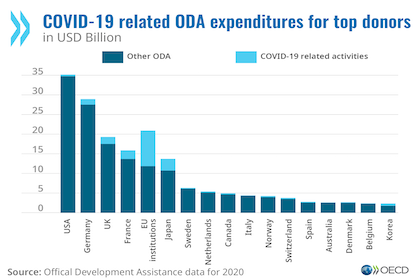23/03/2021 – Creating an emergency Rapid Response Forum to ensure global supplies of essential goods continue to flow during major international crises is one of a broad range of recommendations contained in a new OECD report to the G7 on building economic resilience.
Fostering Economic Resilience in a World of Open and Integrated Markets says the devastating impacts of the Global Financial Crisis and now the COVID-19 pandemic will continue to leave lasting scars on our economies and societies. With the risk of other systemic threats on the horizon – starting with climate change but also spanning security threats, including cyber attackss – it is critical to learn the lessons of these and previous crises in order to tackle the vulnerabilities of our economic system, absorb shocks and engineer a swift rebound.
Ensuring the resilience of global supply chains of essential goods is crucial, the report says. An emergency Rapid Response Forum would provide G7 and other governments with a means of upstream policy co-ordination and, particularly, consultation ahead of the imposition of any trade restrictions. Such an initiative could also prepare timely co-operation on logistics, transportation, procurement, planning and communication.
Commissioned by the UK government, which is currently holding the G7 presidency, the OECD report underlines the need for governments to co-operate both with the private sector through, for instance, supply chain stress tests and emergency planning, and with other countries to boost transparency, discipline export restrictions and adhere to international regulation and standards.
The report says the COVID-19 crisis has caused a huge surge in demand for certain goods, notably in the health and information technology sectors but argues that global supply chains have been part of the solution. After shortages of masks and personal protective equipment, in particular at the beginning of the pandemic, both global production and trade of facemasks later increased tenfold to meet demand.
Strategies based around a reliance on domestic production are unlikely to ensure supply of essential goods and can remove important risk management options such as the diversification of sourcing, the report says. Although temporary scale-up of domestic production for essential goods could be explored as a risk management strategy, reliance on domestic production is not cost-effective nor feasible for strained health budgets, especially for lower income countries, which are almost entirely dependent on global markets to source medical products related to COVID-19. Global supply can allow products to be sourced from the most efficient and cost-effective supplier and enable access to more and different varieties of medical products, ensuring that future surges in global demand are fully met.
Presenting the report alongside Lord Sedwill, chair of the G7 Panel on Economic Resilience, OECD Secretary-General Angel Gurría said: “As we have seen in the past decade alone, in today’s interconnected world, shock events can quickly cascade across borders and economic sectors, and have devastating effects on people’s lives, jobs and opportunities, and on their trust in governments, institutions and markets.”
“Building economic resilience in the face of future shocks is a global challenge for the post-COVID world. For global markets and supply chains to serve as a source of resilience, governments and the public need to have the confidence that markets are and will remain open and fair, including during times of stress.”
Lord Sedwill said: “The unprecedented impact of the covid pandemic on the global economy has highlighted issues of resilience, arising from the growth of monopolies, geopolitical trade tensions, global economic governance falling behind innovation and technology, and the supply of the critical elements essential to the future economy. In response, we should renew our common purpose and commitment to open, well-regulated global markets which promote the green transition, inclusive growth and economic resilience as we build back better.”
The report looks at how to build resilience in global markets, including by reducing distortions and promoting a level playing field for competition, trade and investment. Ensuring global markets are reliable and predictable includes ensuring access to critical raw materials. This calls for enhanced co-operation to develop international agreements for stronger monitoring, notification and disciplines on export restrictions on critical raw materials, promoting responsible sourcing and increasing circularity in this sector. Tackling harmful practices that undermine trust such as foreign bribery is also key.
The OECD proposes governments revise their risk management policies and frameworks to ensure a systemic all-hazards-and-threats approach to resilience with international co-operation playing a central role. This could be supported by a comprehensive evaluation of the lessons learnt from the COVID-19 crisis, including benchmarking and comparison of national preparedness responses.
The OECD says emerging technologies, particularly digitalisation, can contribute to boosting resilience through prevention, absorption and recovery capabilities but can also pose threats. Among its recommendations, the report says governments could strengthen the responsiveness of innovation systems to global policy challenges, reconsidering the way they are organised, structured and financed. It also proposes linking support for innovation more closely to broader public policy objectives and improving international collaboration on emerging technology governance, including by moving towards smarter and more agile regulation.
For further information, journalists are invited to contact the OECD Media Office (tel. +33 1 4524 9700)
Working with over 100 countries, the OECD is a global policy forum that promotes policies to improve the economic and social well-being of people around the world.
